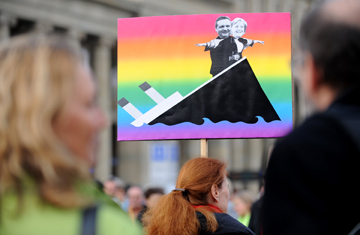
German Chancellor Angela Merkel and Stefan Mappus, premier of Baden-Württemberg, appear on a poster at an antinuclear protest on March 14, 2011, in Stuttgart
While authorities in Japan work desperately to prevent a nuclear catastrophe, on the other side of the world in Germany, Angela Merkel is facing the political fallout. With an important election in the southern state of Baden-Württemberg being held on March 27, Merkel's future as Chancellor could be decided at kitchen tables like the one in the modest Stuttgart home of Hanna and Volker Schwerteck. The young middle-class couple has plenty of reasons to back Merkel's Christian Democratic Union (CDU) at the polls, but there is one reason why they won't vote CDU this time: the party's support for nuclear power.
A doctor on maternity leave from a local hospital, Hanna Schwerteck says she has always opposed nuclear power but refuses to be pigeonholed as a leftist for her environmental views. "We don't belong to one camp or the other, and I certainly don't feel disinclined to vote for the CDU," she says. "But you definitely can't vote for them now. They have been vehement supporters of nuclear power."
Voters in an election in the eastern Saxony Anhalt state on Sunday left Merkel's CDU in power, but also gave the Greens a huge boost — a strong warning ahead of the upcoming elections in Baden-Württemberg and Rhineland Palatinate. Defeat for the CDU in Baden-Württemberg — a CDU stronghold since 1953 — on March 27 would be a major blow to Merkel's government and her bid for re-election in 2013. Fearing that public concern about the safety of Germany's nuclear power stations could turn against her, Merkel on March 15 announced a stunning volte-face of her previous policy, ordering the closure of seven of the country's oldest nuclear plants for at least three months while the government subjects them to stress tests. And she has begun positioning herself as the advocate of nuclear safety in Europe, announcing on March 19 that she would urge the adoption of uniform nuclear-safety standards at next week's council of ministers meeting.
Merkel's decision to shut the nuclear plants is surprising given Germany's history of political bickering over the future of nuclear power. As the main opposition to the previous government, the CDU supported a plan to phase out nuclear power. Then, last year, Merkel's coalition government backed out of the deal and instead passed legislation to extend the life of the country's oldest nuclear plants. Merkel justified the move by calling nuclear power a transitional technology on the way to building up alternative energy sources such as wind and solar. Critics say the government was just supporting the interests of the energy companies.
The premier of Baden-Württemberg, Stefan Mappus, has been a staunch advocate of nuclear energy and is keen to keep online two of the state's power stations that were scheduled to shut down this year. Mappus came under intense pressure last year over protests against the Stuttgart 21 project, a $6 billion plan to put the city's central train station underground and build a new neighborhood with offices, shops and apartments aboveground. The issue became a national scandal when police attacked a group of protesters — including senior citizens and children.
Just as anger over Stuttgart 21 appeared to be subsiding, Japan suffered a record earthquake that crippled four nuclear reactors and had the world worrying about a repeat of Chernobyl. In Germany, a renewed antinuclear movement kicked into gear.
There are few places in Germany where antinuclear sentiment is as strong as it is in Baden-Württemberg. It was there in the 1970s that protests in Whyl blocked construction of a nuclear power plant, giving birth to the Green Party. And just west of Stuttgart, the village of Mutlangen became a national symbol of protest against U.S. nuclear cruise missiles stationed there in the 1980s. On March 12, protesters stood in a 45-mile (72 km) human chain from Stuttgart to the Neckarwestheim nuclear power plant, demanding that Merkel return to the so-called energy consensus and shut down the country's nuclear reactors. "We needed 20,000 people to create the human chain, and secretly we were hoping 40,000 would come — and 60,000 turned up," says Berthold Friess, head of the state chapter of the BUND environmental group that organized the protest.
"Before Japan, it looked like the CDU was pulling ahead again [in Baden-Württemberg]," says Wolfgang Molitor, deputy editor of the Stuttgarter Nachrichten, one of the city's two dailies. "Now the race is open again." A poll conducted by Forsa just before the Japan earthquake projected that the CDU and the Free Democratic Party had a slight majority in the state. But a poll released on March 18 by the national broadcaster ZDF shows a dramatic change, revealing that voters in Baden-Württemberg are flocking to the Green Party, the only party that has been consistently opposed to both the Stuttgart 21 project and nuclear power. The Greens, who according to the poll stand at 25%, now have a realistic chance of becoming the leading party in a coalition with the Social Democratic Party and forming a new government in the state after the March 27 election.
To some in Germany, the idea of putting control of one of the nation's most prosperous states — Baden-Württemberg's unemployment rate is at 4.5%, well below the national average of 7.3% — into the hands of the Greens might come as a shock. But the prospect does not seem to bother many voters. "A Green state premier? Why not?" says Volker Schwerteck. "The Greens is the only party that has been consistent. And if it doesn't work out we can vote them out again in four years."
